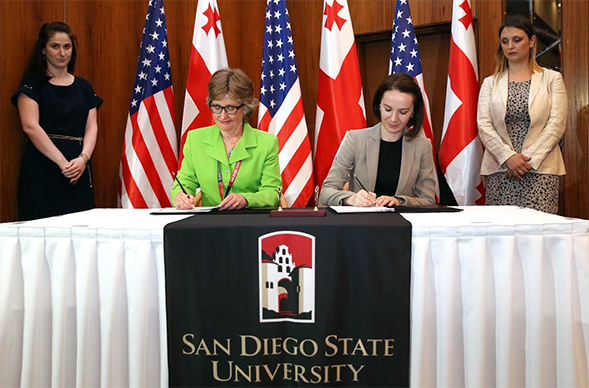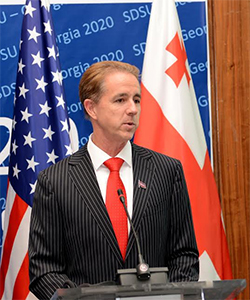SDSU Announces Partnership with Nation of Georgia
At three campuses in Tbilisi, Georgian students will earn SDSU degrees in STEM fields.

In a first-of-its kind endeavor, San Diego State University is partnering with three prominent universities in the Eastern European nation of Georgia to open SDSU campuses in the Georgian capital, Tbilisi.

The campuses will offer SDSU curricula in several science, technology, engineering and mathematics (STEM) disciplines and will confer undergraduate degrees to graduates of the programs. Kenneth Walsh, chair of SDSU’s Construction Engineering and Management degree program will be SDSU-Georgia’s first dean. Classes are scheduled to begin in 2015.
SDSU was one of 28 universities that competed for funding from the U.S. Millennium Challenge Corporation (MCC) to create a joint higher education program in Georgia. An international committee of Georgian officials and U.S. diplomats and aid officers awarded the $30-million contract, which is financed by MCC with some financial input from the Georgian Government. The project will be a joint partnership between SDSU, MCC, and the Georgian government. No state funds will be used to support the program.
“I want to applaud San Diego State University’s vision for delivering education globally,” said MCC CEO Dana J. Hyde. “I have no doubt that this partnership will enrich the educational experiences of both Georgian and American students, who will have, for the first time, the unique opportunity to learn alongside each other.”
The award is the largest grant in SDSU’s history, and marks MCC’s first foray into effecting change through higher education.
"That San Diego State University has been selected by the Millennium Challenge Corporation to help develop the future workforce of Georgia is an acknowledgement of the high quality and strengths of our academic programs here at SDSU," said Chukuka S. Enwemeka, SDSU Provost and Senior Vice President of Academic Affairs. "It denotes international recognition of our curricula and faculty in the areas of STEM."
In 2012, MCC put out a call for American English-language universities to present plans to develop educational partnerships with Georgia in order to shore up that country’s higher-education infrastructure, especially in the areas of science and engineering. Currently, the Georgian economy is struggling under an antiquated educational system that underprepares its graduates for high-skill work, Walsh said.
“The government of Georgia determined that trained engineers and scientists are critical to their economic development,” he said. “Engineers and scientists build innovation economies and the infrastructure of a modern society — both things that Georgia really needs to take the next step.”
SDSU-Georgia — with campuses at Tbilisi State University, State University of Ilia and Georgian Technical University — will initially offer degree-granting programs in electrical engineering, computer engineering, computer science and chemistry/biochemistry. Later, civil engineering and construction engineering degree programs will come online. English preparation courses will also be available for SDSU-Georgia students and faculty.
The courses for these programs will be taught in English and will offer curriculum identical to what is taught at SDSU, with only minor alterations for cultural appropriateness, Walsh said.
“A key thing to recognize here is that we do not plan to offer a different degree program or have different standards in Georgia,” he said. “The students at SDSU-Georgia will get the same SDSU degrees as students at our main campus. They will just be studying in their native country.”
Over time, Georgian partner faculty will develop the knowledge, skills and expertise to apply for and receive U.S. professional accreditation, enabling them to create their own degree programs built upon the initial SDSU curriculum.
It’s not clear yet exactly how many Georgian students will enroll in the programs. The number of enrollees will be one barometer of success for SDSU-Georgia, Walsh said. Once the program is fully up and running, target enrollment will be around 2000 students.
Also as part of the partnership, SDSU will invite faculty from Georgian universities to visit San Diego, shadow SDSU faculty, earn Ph.D.s, and co-teach classes. SDSU science and engineering students will also have numerous study-abroad opportunities in Tbilisi, where they will work alongside SDSU and Georgian faculty to expand their international knowledge. Former SDSU provost Nancy Marlin, who helped design SDSU’s bid for the award and shepherded the university through the review process, said she expects several joint research projects to arise from these cross-border collaborations.
SDSU is hosting an open house in Tbilisi today in coordination with the announcement of the SDSU-Georgia program.
Walsh said he is excited to be spearheading such an ambitious project with the potential to change an entire country.
“This is an opportunity that might come along only once in a career, if you are really lucky,” Walsh said. “It is exciting to me because it embodies so much of what SDSU is. It's fundamentally an international program. It's entrepreneurial. It's bold. And it's all about building workforce, creating careers and creating new research collaborations. As the dean through this formative period, I hope to lay the groundwork for a really transformative institution in Georgia.”



